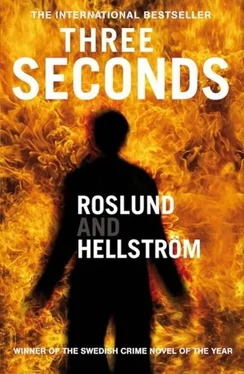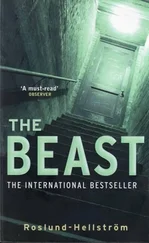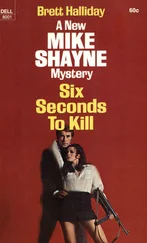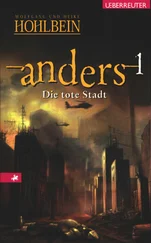Maybe then he'd find out where her stone was, and maybe then he would go all the way there.
Next time.
The corridor at Homicide was deserted and dark. He helped himself to a forgotten, rather dry slice of bread from the basket on the table in the staffroom and pressed two cups of coffee out of the machine and then continued down to the office that would never sing again. He ate and drank his simple breakfast and lifted up the thin file for an ongoing investigation that was at a standstill. They had managed to identify the victim within the first couple of days as an informant for the Danish police, had secured traces of drug mules and amphetamines and confirmed that there had been at least one other Swedish-speaking person in the flat at the time of the murder, the voice that had raised the alarm that he had now listened to so often it had become a part of him.
They had discovered a Polish mafia branch called Wojtek, assumed to have a head office in Warsaw, and then they hit a wall.
Ewert Grens chewed the dry, hard bread and drank up the coffee that was left in the plastic cup. He didn't often give up. He wasn't the sort to do that. But this wall was so long and high and no matter how much he had pushed and shoved and shouted in the past two weeks, he had not managed to get around it or beyond it.
He had followed up the blood stains on the shirt that was found in a garage and had come to a dead end in a register with no matches.
Then he had gone to Poland with Sven to follow up the yellow stains that Krantz had found on the same item of clothing and had ended up in the remains of an amphetamine factory in a town called Siedlce. For a couple of days they had worked closely with some of the three thousand policemen assigned to a special police force to combat organized crime, and had encountered a sense of helplessness, a hunt that never gave results, a nation with five hundred criminal groups that fought every day for a slice of the domestic Polish capital cake, eighty-five even larger criminal groups with international connections, police who frequently took part in armed battles, and a nation that raked in more than five hundred billion kronor every year from the production of synthetic drugs.
Ewert Grens remembered the smell of tulips.
The amphetamine factory that was connected to the stains on the murderer's shirt had been in the basement of a block of flats in the middle of a rundown and dirty neighborhood a couple of kilometers west of the center-uniform buildings once built in their thousands as a temporary solution to an acute housing problem. Ewert Grens and Sven Sundkvist had sat in the car and watched a raid that had ended in a shoot-out and the death of a young policeman. The six people who were in some of the rooms in the basement had then not said a peep to either the Polish or Swedish interrogating officers, and had remained silent, just sneering or staring at the floor, as they knew, of course, that anyone who opened their mouth would not live for long.
Grens swore out loud in the empty room, opened the window and shouted something at someone in civvies who happened to be walking along the asphalt path across the courtyard of Kronoberg, then wrenched open the door and limped up and down the long corridor until his back and forehead were wet with sweat, then sat down on his chair to catch his racing breath.
He had never felt like this before.
He was used to anger, almost addicted to it. He always looked for conflict, hid himself away in it.
It wasn't that.
This feeling, like it was there, the truth, as if the answer was staring at him, laughing at him, a peculiar feeling of being so close without being able to see.
Ewert Grens took the file in his hand and went to lie down with his legs outstretched on the floor behind the corduroy sofa. He started to leaf through the papers starting with the voice informing the police about a dead man in Västmannagatan, through the following two weeks working at full capacity with access to all technical resources, to his trips to Copenhagen and Siedlce.
He swore again, maybe shouted at someone again.
They hadn't gotten anywhere.
He was going to lie on the floor until he understood whose voice he had listened to so many times, what it was he didn't understand and couldn't quite get hold of, why the feeling that the truth was close at hand, laughing at him, was so intense.

He heard the keys jangling.
Two guards unlocking and opening the cells at the far end, the ones with a view over the large gravel pitch, Cell 8 and opposite, Cell 16.
He braced himself, prepared himself for the twenty minutes each day that could mean death.
It had been a god awful night.
Despite having been awake for days, he had lain there, waiting for sleep that never came. They were there with him, Zofia and Hugo and Rasmus, they had stood outside the window and sat on the edge of his bed, lain down beside him and he had been forced to drive them away. They no longer existed; inside he had to stop feeling, he had a mission that he had chosen to complete and that left no room for dreaming-he had to suppress, forget. Anyone who dreamed in prison soon went under.
They were getting closer. The keys jangled again, Cell 7 and Cell 15 were opened and he heard a faint morning and someone else reply go to hell.
He had eventually gotten up-when Zofia had disappeared and the dark outside was densest he had held the dread at bay with chin-ups and sit-ups and jumping on and off the bed with both his feet held together. There wasn't much space and he had hit the wall a couple of times, but it was good to sweat and to feel his heart beating in his rib cage.
His work had already begun.
In a matter of hours on that first afternoon he had earned himself the respect in the unit that he needed to continue. He now knew who was in charge of supplies and dealing, in which units and in which cells. One of them was here, the Greek in Cell 2; the other two were on separate floors in Block H. Piet Hoffmann would get in the first grams soon, the ones he was responsible for and that he would use to blow out the competition.
The guards were even closer, opened Cell 6 and Cell 14. Only a couple of minutes more.
The time after the cells were opened, between seven and seven twenty, was crucial. If he survived that, he would survive the rest of the day.
He had prepared himself in the way that he would prepare himself every morning. In order to survive, he had to assume that in the course of the evening or night, someone had found out about his other name, that there was a Paula who worked for the authorities, a snitch who was there to break the organization. He was safe as long as the cell was locked, a closed door would hold off an attack, but the first twenty minutes once the cell had been opened, after the first good morning, were the difference between life and death; a well-planned attack would always be carried out when the guards had disappeared into their room for a cup of coffee and a break-twenty minutes with no staff in the unit and the time when several of the many murders in prison had been carried out in recent years.
"Good morning."
The guard had opened the door and looked in. Piet Hoffmann was sitting on the bed and stared at him without replying-it wasn't how he felt, it was just something he said because the rules said he should.
The idiot guard didn't give in, he would stand there and wait until he got an answer, confirmation that the prisoner was alive and that everything was as it should be.
"Good morning. Now fucking leave me in peace."
The guard nodded and carried on, two cells at a time. This was when Hoffmann had to act. When the last door was opened it was too late.
Читать дальше













